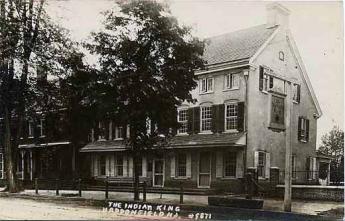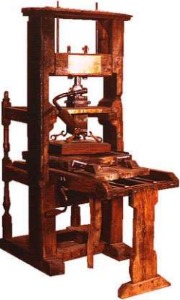Related Topics
Quakers: The Society of Friends
According to an old Quaker joke, the Holy Trinity consists of the fatherhood of God, the brotherhood of man, and the neighborhood of Philadelphia.
Haddonfield (all 26)(1 of1)volume 38
 Haddonfield is a bit of a secret. It's Philadelphia's "Main Line, East"
Haddonfield is a bit of a secret. It's Philadelphia's "Main Line, East"
Reminiscences
"The past is never dead. It's not even past." -- William Faulkner, Requiem for a Nun
It Ain't Necessarily So

|
| Benjamin Franklin Print Press |
The Protestant Reformation provoked a wide variety of reasonings, and the Quaker position is at one extreme of them. One way of looking at it is to see the Reformation as largely a reaction to the invention of the printing press. At first, there was the impact of Latin versions of the Bible, or Vulgate, which could be read by priests like Martin Luther, and possibly interpreted by them to vary from established Church doctrine. Translation of the Bible into common languages subsequently permitted educated parishioners to read the Bible for themselves and draw their own conclusions. Fundamentalist branches of the church tend to place almost total reliance on what they can read for themselves, and consequently, authenticity is highly important to them. The Quakers go a step further, encouraging each member to come to his own spiritual viewpoint ("There is that of God in every man."), using the Bible as merely one important resource. Although others sometimes regard them as spiritually adrift, the Quaker idea is that if something is really true, everybody who thinks hard about it will eventually come around to much the same conclusion. (Related to this attitude is a strong belief in the ultimate triumph of democracy, and the essential rightness of market-set prices.) Some people try harder than others, of course, and they come to be regarded as "weighty" Friends, likely to have reached the correct conclusion somewhat sooner than others.
One very weighty Friend was Henry Cadbury, an American relative of English candy makers. Henry decided he wanted to spend his life teaching the Bible and went to Harvard Divinity School. He became in time the leading authority in the world on the Book of Acts, editing that section of the Interpreter's Bible, and rising to be Professor of Divinity at Harvard. Henry knew his stuff, so to speak.

|
| Henry Cadbury |
One fine summer day, Henry was seated in the front row of the Haddonfield Meeting. Birds twittered outside the open doors and windows, but otherwise, the gathered meeting was entirely silent. It was even beginning to look as though this meeting would be one of those occasional instances when nothing is said for an entire hour -- a "silent meeting". But, no, a visitor came through the open back door of the meetinghouse, in response to the sign found outside almost every meetinghouse, "All Are Welcome". The man was evidently a fundamentalist, and seeing a large audience all sitting silently waiting for something, he advanced boldly to the front of the meeting and began to speak.
The Bible was the Word of God. Every word in The Bible was true -- literally, and incontestably true. The theme was repeated several times, without an apparent response from the audience.
Finally, Henry Cadbury stirred himself. "Well, it has always struck me...". Oh, oh. Look out, here it comes.
"It has always seemed to me, that the most quotable parts of the Bible, are mainly based on the faulty translation."
Originally published: Monday, June 26, 2006; most-recently modified: Wednesday, May 22, 2019
| Posted by: Margaret Fisher | Apr 10, 2007 8:53 PM |